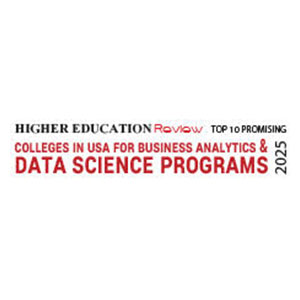
Wake Forest University: Producing Future Business Leaders Through Industry-Driven Programs
By Scott Shafer, Area Chair & Associate Dean - MSBA
The education sector is constantly evolving with new challenges emerging that affect both institutions and students. Universities today are trying to focus on industry-relevant skills, commitment to quality teaching, and effectively preparing students for the evolving workforce. The challenge of applying theoretical learning to real-world experiences, changing technology, and meeting the individualized education needs of a broad student population, all while maintaining a strong commitment to high-quality education, is being addressed through innovative and industry-aligned academic programs.
Wake Forest University in North Carolina has a top-ranked business school that addresses these challenges by aligning its programs with international trends, innovative curriculum practices, and a practical learning culture. Through hands-on learning experiences, such as its Graduate Consulting Program and other market-connected initiatives, the University presents a model for how schools can transform to meet the needs of students and businesses in today's complex global marketplace. The University ensures that its students have the necessary skills, knowledge, and experience to succeed in the business world. “At Wake Forest University, we are dedicated to an ethically informed education in a climate that values personal growth, community interaction, and individual honor”, says Scott Shafer, Area Chair and Associate Dean of the MSBA Program at Wake Forest University.
MSBA & Business Analytics
The University provides a Master of Science in Business Analytics (MSBA) program, launched in 2016 after benchmarking over 30 top analytics programs worldwide. Developed with input from executives at 15 Fortune 500 companies, the MSBA is designed to meet real-world industry demands. Built on three pillars of Analytical Thinking, Business Acumen, and Power Skills, it strikes a balance between theory and practical application, preparing students to tackle complex business challenges with confidence.
An essential feature of the MSBA is the Business Analytics Practicum, which is a two-semester experience where students address the real challenges of corporate and non-profit partners. Structured in four phases, namely Introduction, Mess to Model, Model to Insight, and Insight to Impact, the practicum emphasizes hands-on learning, teamwork, and adaptability. Past projects have tackled issues like supply chain optimization, pricing strategies, and environmental data visualization, giving students a real-world experience for their skills.
At Wake Forest University, we are dedicated to an ethically informed education in a climate that values personal growth, community interaction, and individual hono
The MSBA curriculum is packed with innovative, application-focused courses that mirror actual business scenarios. In Machine Learning for Business Analytics, students dive into competitions using real datasets, honing their technical prowess. Storytelling for Impact sharpens its ability to craft data-driven presentations for executive audiences. Marketing Analytics includes simulations where students manage digital ad campaigns and run A/B tests, while Operations and Supply Chain Analytics blend optimization modeling with practical considerations like risk and sustainability. “These courses ensure students do not just learn theory, but they apply it”, says Shafer.
Dedicated Faculty
The faculty behind these programs represents the teacher-scholar ideal, combining academic expertise with a passion for teaching. The faculties are selected through a rigorous process that includes teaching demonstrations, and they also undergo regular evaluations to maintain high standards. Junior faculty face reappointment reviews every two years, submitting portfolios and receiving peer feedback. “Beyond the classroom, our faculties mentor students and shape the curriculum, fostering close relationships that enrich their learning experience”, Shafer added.
The school’s strong industry relations are a key strength. The advisory board of senior professionals meets twice a year to guide the curricula, ensuring it aligns with market trends and workforce needs. The board also mentors students, offering real-world perspective with events like Draft Night to further bridge academia and industry, letting students select live practicum projects in a consulting-style experience that portrays professional life.
To prepare students for their careers, the MSBA program begins with a two-day orientation focused on teamwork, global perspectives, and program expectations. A dedicated Career Management course improves skills in personal branding and job readiness, while workshops, alumni panels, and faculty sessions emphasize cross-cultural collaboration and ethical decision-making. These initiatives ensure the graduates are not only skilled but also adaptable and principled.
Pathway to Future
Looking ahead, the School of Business is poised for further innovation. A recent program review, named the Deep Dive, sparked enhancements for spring 2025, including the integration of generative AI tools, a stronger focus on ethical AI use, and expanded communication training. For the upcoming year, they are planning to continue to infuse generative AI into the curriculum and include the Analytics Challenge, a cross-course project to deepen practical skills as well as utilizing a proprietary data lake to train students on handling complex datasets.
In a rapidly changing world, Wake Forest University’s MSBA program stands out as a forward-thinking, industry-aligned force. By providing real-world experience, and continuous market feedback, it equips graduates to lead with ethics and drive data-informed change across industries. With their commitment to excellence and innovation, Wake Forest University is shaping the business leaders of tomorrow ready to make an impact today.


